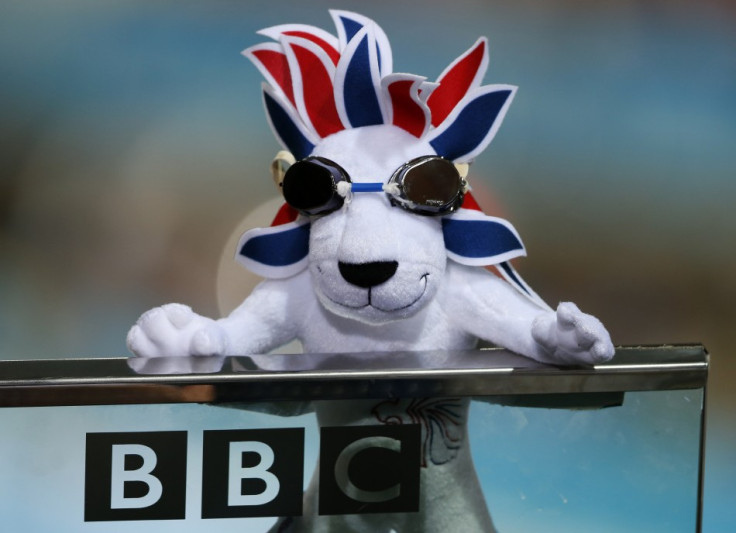Back in USSR and how BBC Failed Journalism Dope Test to become Ministry of Truth [BLOG]

Over the last two weeks anyone over the age of 35 would have cast their mind back to the bad old days of Olympic competition and shuddered.
The greatest love-in in history, aka the London Olympics 2012, stands in warm, fuzzy contrast to the the bygone era when the Games were the best alternative to nuclear armageddon.
The athletes from the USSR, clad in their blood red vests stamped with the hammer and sickle logo, were a humourless, threatening bunch who would do anything to prove communism was physically and morally superior to Western liberal democracy, including pumping themselves full of steroids on an industrial scale - particularly pronounced in their female athletes who began to look like mutant yetis.
Indeed, when one of its athletes underperformed somebody in the family - probably your dad - clustered around the light-emanating crate in the corner of your living room, aka analogue TV with three channels, would (only half) joke: "Another one for the Siberian salt mines."
The West also abused the Olympic ideal. The policy of corrupting it as political scoreboard reached its nadir in 1980 with a USA-led boycott of the Moscow games (reciprocated by a Soviet boycott of the 1984 Los Angeles games), as a protest at the Soviet invasion of Afghanistan. The absence of the USA et al threw up some curious aberrations, most notably a white guy won the 100m sprint and, in the shape of Alan Wells, a British one to boot. Two decades later the USA launched similar military adventure in Afghansitan, after 9/11, but chose not to boycott itself. But I digress.
Whether it was fear, the idealist belief in the greatness of the workers' paradise or the organising power of the centralised state, the USSR always topped the medal tables. In the last games of its existence, in Seoul, it won 132 medals (55 gold) to the USA's 94 (36 gold). In fact, the USA actually came third behind the USSR satellite East Germany which took home 102 medals (37 gold).
Indeed, the Soviet sporting legacy lives on despite the crumbling of the empire Stalin built and the arrival of democracy and freedom across the former socialist fiefdom. If you compile the medal scores from the London 2012 Games of the nations that once came under the USSR banner, they beat the actual winner, the USA, comprehensively.
The medal count was:
United States: 46 gold 29 silver 29 bronze Total: 104
V
Russia: 24 25 33
Kazakhstan 7 1 5
Ukraine 6 5 9
Belarus 3 5 5
Azerbaiijan 2 2 6
Lithuania 2 1 2
Georgia 1 3 3
Uzbekistan 1 - 3
Latvia 1 - 1
Armenia - 1 2
Estonia - 1 1
Moldova - - 2
Tajikistan - - 1
Former USSR 47 gold 42 silver 73 bronze Total:160
Back in the USSR?
Meanwhile, the ghosts of the Soviet propaganda machine appears to have transmigrated to a new state body, the BBC.
Whilst its coverage of the London Games across its media platforms was a triumph of production values, its committment to sports journalism went overboard quicker than Michael Phelps starting the 100m butterfly.
Anchors, reporters, commentators and pundits were so unashamedly partisan towards Team GB, so manic about its success and non-success, they resembled the Pravda newsroom on Ecstasy.
One soon realised that the Reithian principles had been chucked hammer-like into the long grass in the build-up, with the overwrought coverage of the torch relay. By its end, the Beeb's journalists were mouthing statstics straight out of the Ministry of Truth. "One in five Britons and one in three Londoners" it was claimed had lined up to cheer the torch's odyssey around the British Isles. Yeah Right! And the Lenin Tractor Factory in Vladivostok beat its five-year plan target by 10,000 per cent.
When Team GB won its first gold medal in the rowing, the BBC entered an unseemly state of rapture. As Heather Stanning and Helen Glover (the favourites, by the way) closed in on the finish line the commentators were bursting a blood vessel of patriotic joy and compeletely failed to mention, even in passing, who had won silver and bronze.
On Super Saturday when Team GB clinched three historic athletics gold the BBC was so excited it completely failed to mention that the Blue Riband women's 100m had also been run and won by the Jamaican Shelly-Ann Fraser-Pryce.
Criticism was forbidden. When Claire Balding dared to suggest Rebecca Addlington's performance in the pool was the cause for some disappointment she was forced to humiliatingly recant within a few minutes.
Meanwhile, John Inverdale was in tears of sympathy at one point and Steve Redgrave - once a morose, terse athlete - was hugging sweaty, exhausted rowers by the dozen. Veteran presenters were abandoning their calling and turning into the athletes' "besies".
Despite the world being in London, the BBC blinkered its coverage down to Team GB plus Usain Bolt and Michael Phelps. There was also a country called China doing quite well and Australia wasn't (no schadenfreude there, not!) but for the BBC the other 200-odd teams were their just to fill out the cast of thousands and populate the great panning shots of Buckingham Palace and Greenwich. Indeed, I don't believe the BBC even dared to interview someone who didn't speak English.
Satirical magazine Private Eye summed up the BBC's loss of its senses with a mock online front page relegating the alien invasion to "other news".
By mid-second week of the Games, there were the first signs of a comedown form the Britannia-induced high. A story - that every other media outlet had already written - that dared to question the performance of the Team GB's swimming squad suddenly appeared as a subversive line on the online home page. Then John Inverdale went slightly Paxman on Lord Coe and teed-up a few questions about tickets sales and playing "rock music" in the Olympic stadium.
Glasnost really seemed to have reached the politburo - sorry, I mean the BBC senior magangement - when channel controllers responsible for broadcasting London 2012 news footage and results were being told to ensure "other great sporting achievements" were also covered. The instructions from Director General Mark Thompson came after overseas publications have raised questions over the BBC's impartiality.
Time magazines Catherine Mayer, Europe editor, pointedly pointed out: "'Magical' is a word your correspondents have overused in recent days as they've struggled, and most often failed, to contain their excitement at Team GB's golden streak. It's going to be a glorious, glorious win. Oh yes! Oh YES!,'" screamed your trackside commentator, as Mo Farah crossed the finish line to clinch the 10,000m race. In the studio, your pundits erupted in joy."
Losers had became winners in BBC doublespeak. The typical spin went: "Brit in good lane. Brit great start. Brit going well. Brit could do it. Brit. Brit! BRIT!!!" Brit finishes fourth."
Eventually, to calm the pundits' ardour gold medal winning javelin star Tessa Sanderson was shipped in to sprinkle a little bromide. Down-to-earth and forthright she exposed the happy-clappies with some honest talk about Team GB's obvious underachievement in certain events, including the 4x100m and most of the field events. It was a brief moment of truth.
But by the last weekend the hyerbole was back. The Men's kayak double (K2) 200m on Saturday ended with the British pair getting a bronze, after losing out to Russia and Belarus. Grudgingly, the commentators paid tribute to the Russians who overpowered the field, but as for Belarus, to paraphase Neville Chamberlain, it was "a faraway country of whom we know nothing" - and won't now thanks to the BBC Olympics coverage.
Fool's gold all round.
Julian Kossoff is managing editor of IBTimes UK
© Copyright IBTimes 2025. All rights reserved.






















